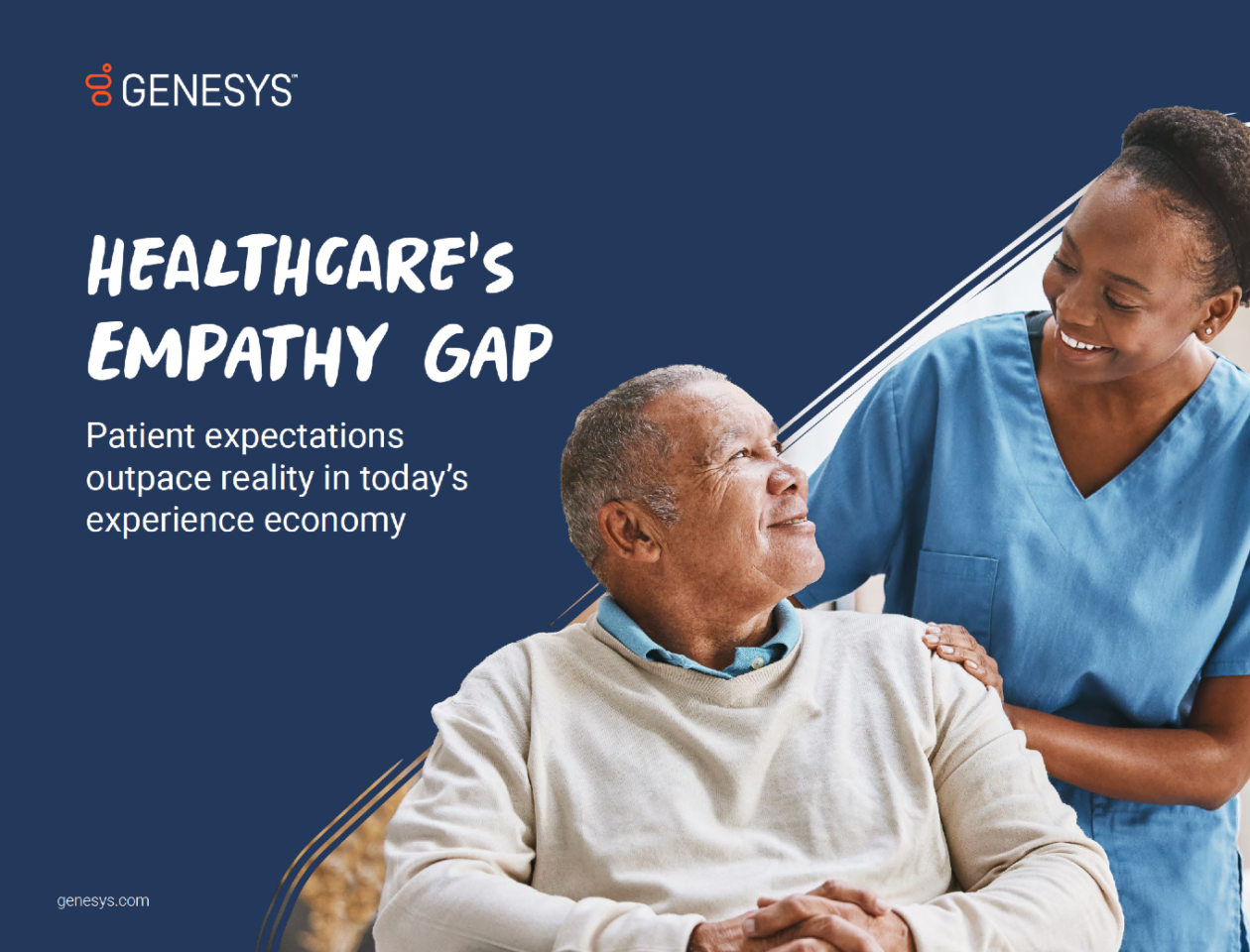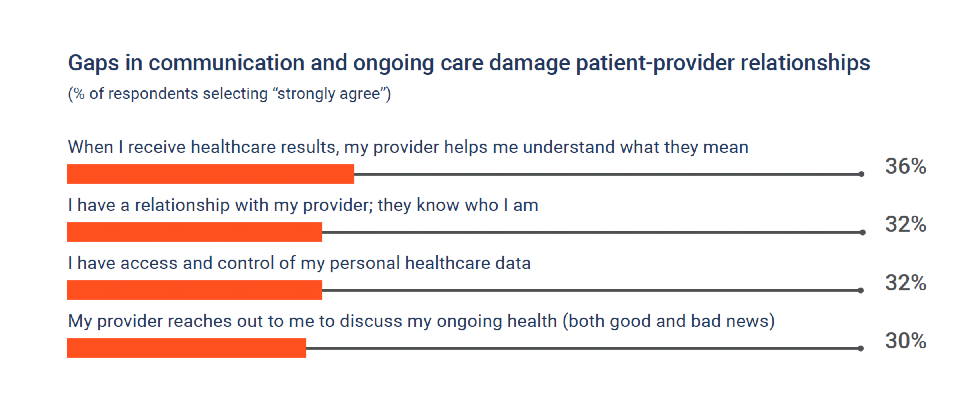Your Genesys Blog Subscription has been confirmed!
Please add genesys@email.genesys.com to your safe sender list to ensure you receive the weekly blog notifications.
Subscribe to our free newsletter and get blog updates in your inbox
Don't Show This Again.

Delivering exceptional healthcare encompasses more than what happens in the examination room. Modern healthcare providers are competing on end-to-end patient experiences. This includes everything from web interactions and phone calls, booking appointments and receiving advance information, to offering caring, timely and transparent ongoing support.
Quality journeys drive health outcomes and satisfaction for patients and their families, as well as care plan adherence and efficiencies. And they have a direct impact on reimbursements to providers.
In the US, the CMS Five-Star Quality Rating System evaluates hospitals across criteria that include the quality and convenience of patient experiences and their healthcare outcomes. Increases in ratings translate to huge benefits to those outcomes, as well as to the provider’s top and bottom lines. Genesys worked with a healthcare system in New York to establish that a half-point increase in its Star Rating equated to $25 million in additional annual revenue through a 5% bonus payment from CMS.
To design and optimize care experiences, healthcare providers must understand which moments matter the most. And they must know how to exceed specific expectations. The sum of those moments is the overall quality of the experience — and that creates the memory patients will carry with them long term.
Genesys research reveals an empathy gap in how healthcare providers deliver patient experiences. Patients want to feel heard and understood, knowing providers are paying attention to their needs and concerns. Supporting them on a journey that’s stressful and disruptive means giving them experiences that are simple, convenient and personalized.
Based on a survey of 2,000 adults in the US, the Genesys research uncovers urgent areas to improve patient experiences. The most critical gaps are at the beginning and end of the journey — where lack of information, communication and follow-up support deeply undermine confidence. Just one-third expressed a high level of confidence with any stage of their healthcare journey.

Download the report for insights, opportunities and the path forward for healthcare providers wanting to empower patients with seamless journeys.
By leaving patients to manage their own care plans, providers are damaging loyalty and trust and increasing the risk of poor healthcare outcomes. Rethinking the journey from end-to-end will drive better satisfaction and effectiveness. Here’s what health systems and providers can do.
Many providers aren’t proactively offering their patients even the most basic information, including costs, services and treatment options. For example, although many agree cost is an important factor in their care, only 22% strongly agree they were made aware of the costs associated with their care prior to the appointment.
Additionally, people want access to more interaction channels during their care journey, especially when scheduling an appointment. While providers do offer a multitude of channels, only one-third of respondents said it was easy for them to schedule an appointment.
Healthcare providers can help patients to feel more informed and empowered by using artificial intelligence (AI) tools to understand who they’re interacting with (e.g., patient, family member, other caregiver) and why they’re contacting the provider. This will enable providers to predict intent, orchestrate more personalized journeys across preferred channels, and offer more empathetic interactions.
For instance, providers can use AI technology to triage inbound interactions and forward them to either to the appropriate self-service channel or the best-suited nurse or care center agent. Then the provider can use AI in patient care to assist those employees by serving up the right knowledge and resources during interactions to answer questions.
This will require a digital transformation across front- and back-office processes and a cloud-based customer experience platform to connect systems and then provide accessible data and convenient services.
How healthcare providers currently approach treatment makes several patients feel excluded and without power. More than 75% of patients expect to spend at least 15–30 minutes with their clinician.
Yet most appointments last only 13–15 minutes, according to Medscape. Patients feel rushed and that they’re missing the opportunity to process information and ask questions.
Genesys survey findings confirm this. Fewer than four in 10 patients strongly agree their provider spent enough time with them or explained issues in a way they could understand.
One way to close the empathy gap here is to allow for more time for patient interactions. Providers can do this by automating follow-up tasks, such as scheduling additional appointments or tests, providing referrals and care plan instructions, and sending relevant reminders.
Patients get the benefit of extra time with a clinician, as well as less tasks to worry about as they focus on recovery or long-term lifestyle changes. Providers benefit, too, with better informed patients more likely to follow their care programs — lowering costs as a result.
Another approach is to continually optimize processes using journey analytics. This will give healthcare providers real-time visibility into patient interactions. And they’ll be able to identify drivers of dissatisfaction and opportunities to improve processes along the end-to-end patient journey. This results in a positive patient experience and a streamlined approach to care that creates efficiency and lowers risk.
Patients value having an ongoing relationship with their healthcare providers. However, providers don’t communicate consistently enough to build a feeling of connectedness. This leads to missed opportunities to discuss a patient’s ongoing health.
Two-thirds of patients would prefer to hear from their healthcare provider every 3–6 months, but the reality for the majority is 6–12 months. And just one-third of patients strongly agree they have a relationship with their healthcare provider and are known to that provider.

Healthcare providers can use automation and digital technologies to help patients feel connected. Health apps, proactive notifications, telemedicine and wearables are a few options. Apps and wearables, especially, can provide data that enables providers to monitor patients’ health remotely. And they can spot any warning signs of either a lack of care plan compliance or health decline.
Additionally, healthcare providers can empower clinical, service and support staff with tools that help deliver more proactive, personalized patient experiences — in a secure and compliant way. Predictive routing and agent-assist technologies, for example, match patients with the employee best suited to assist them. And the tools provide employees the insights needed to answer the patient’s questions.
Organizations across every industry are competing on customer experience — raising the bar for all businesses. In healthcare, that means medical innovation isn’t enough to attract and retain customers. The confusion, stress and uncertainty many patients experience is creating a healthcare empathy gap.
It’s time for healthcare providers to shift to a patient journey optimization approach that closes the gap. In fact, 82% of executives say understanding customer experience at key points along the full customer journey is important to their business strategy.
By implementing connected technology, measurement and management, healthcare providers can orchestrate and optimize patient experiences in real time. A digital transformation in healthcare requires cloud-based technologies, automation and artificial intelligence to connect and coordinate channels, data, employees, interactions, knowledge and systems.
At a time when 77% of consumers will walk away after five or fewer poor interactions, offering empathetic end-to-end experiences in healthcare is a remedy that will improve loyalty and health outcomes, as well as providers’ business results.
Read the full report “Healthcare’s empathy gap” online today.
Subscribe to our free newsletter and get blog updates in your inbox.